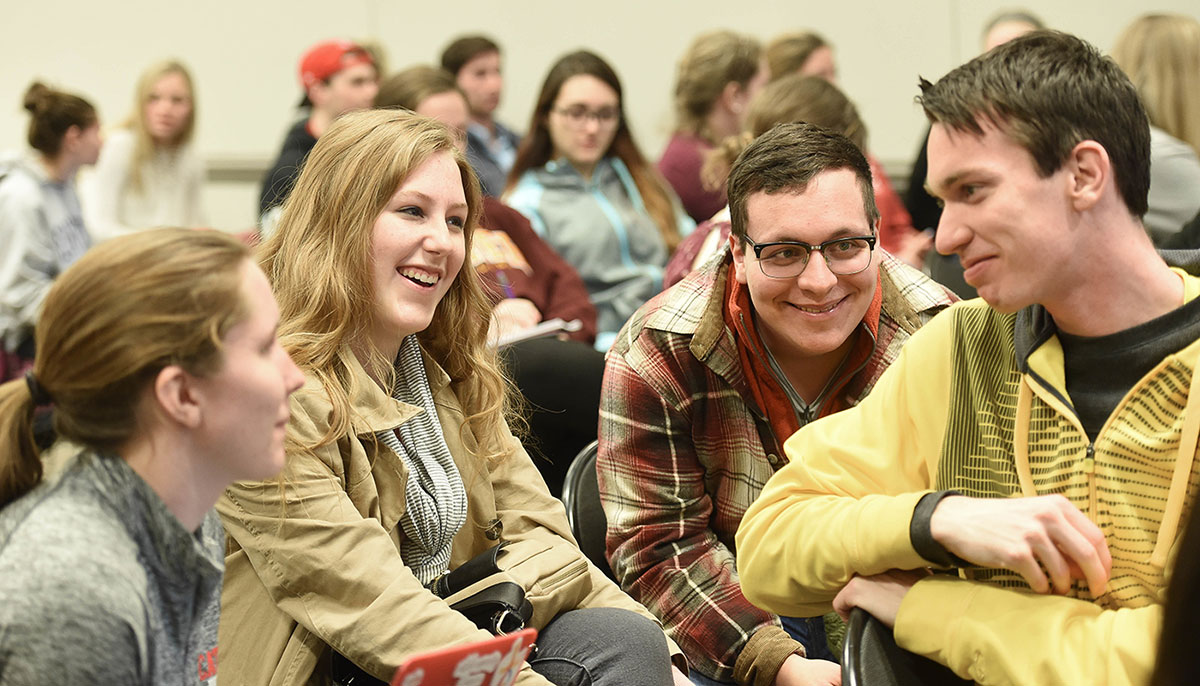

It’s a rainy Friday in March as students gather in McMahon Hall for their 9 a.m. philosophy class, Human Action in Government. The students, who are part of a learning community within the University Honors Program, have been taking classes together three times a week since their first day of college back in August. As they come in from the cold, umbrellas in hand, they chat about their other classes, the unpredictable weather, and even dreams they had the night before.
When their professor, Angela Knobel, arrives, they begin a spirited discussion about the writings of philosopher John Stuart Mill.
“Engaging with other thoughts opposed to you is good mental exercise,” Knobel tells the students, summarizing one of Mill’s major points. “If you’ve never been challenged on your beliefs, and you just hold this viewpoint because you’ve always been taught it, it becomes dead dogma, without any intellect or thought.”
The idea of talking with those who hold different views is a central one for this learning community. Brought together by the University’s First-Year Experience program, these students started the year as strangers with little in common. After spending hours in classes together, debating philosophical and theological ideas, they have learned a lot and developed friendships along the way.
“I think that in college it’s very easy to surround yourself with people who have the same ideas as you,” said Amanda Martin, a theology and religious studies major from Lancaster, Pa. “This community has caused me to spend time with people who don’t necessarily agree with me and led to discussions of some pretty real and hot topics. It’s given me a chance to form my own opinions and learn from other people.”
Giving students a place to discuss and debate in community is one of the core principles of the University’s First-Year Experience program, according to director Herbert Hartmann. As part of the program, every first-year student is assigned to a learning community of 18 students from a variety of majors. The students then take two courses together each semester throughout their freshman year, fulfilling a number of the University’s philosophy, theology, and English requirements. Hartmann hopes that by going through these four core courses together in small classes, students will feel more supported as they adjust to the rigors of college life.
“This is intended to actually make the students a community,” Hartmann said. “The idea is to get them to talk about the writing, what they’re doing, and why they’re doing it, and also to get them to talk about the readings and philosophies. The idea is to spark conversations.”
When Knobel began teaching this particular learning community in January, she said she could already tell that they had bonded as a group.
“You can just see in the group dynamics that they know and like each other,” she said. “When you look at this group, it's clear to me that these kids have had discussions outside of class. I think their conversations outside help facilitate those discussions in class.”
For Marie Erickson, a secondary education major from Pittsburgh, the learning community offered a way to feel comfortable in her new college environment. She’s become good friends with some of the people in her community, and found her roommates for next year.
“Especially in the first semester, there is a learning process in figuring out how college academics are different,” she said. “It’s just nice having a diverse group of students who are going through these classes together, coming in with different backgrounds and different takes on universal subjects.”